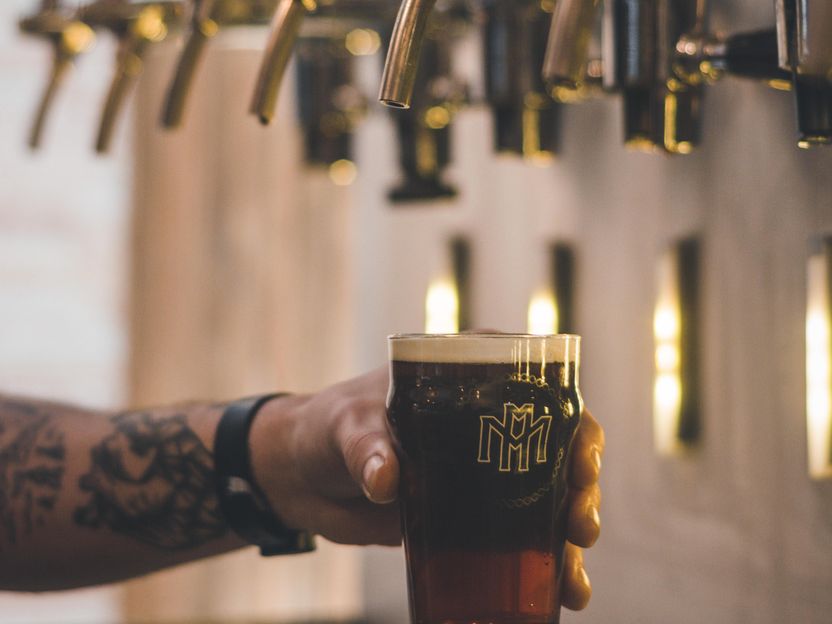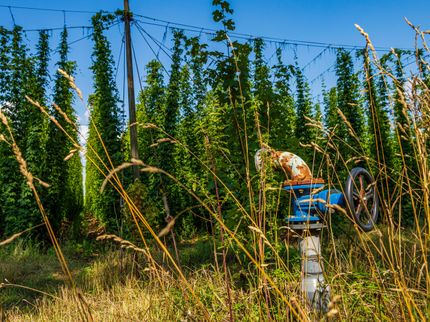Brewers complain about price explosion
Will beer also become more expensive in stores?
Less and less beer is being drunk in Germany. This trend accelerated during the pandemic. Pubs were closed for months, parties were cancelled. Now the costs are even higher. A whole series of breweries are now taking a run at raising prices.

unsplash
Rising prices could also reach beer drinkers in Germany in the coming months. A number of large breweries have announced price increases for large customers in recent weeks. This not only affects the upper price range, but in some cases also the lower price range. Above all, the breweries' profitable keg beer business is suffering badly from the pandemic. Meanwhile, there is talk in the brewing industry of a cost explosion not only for energy, but also for raw materials right down to crown caps.
With the beer paragraph it went in the past year at the same time further downward, as the German brewers federation estimated on Friday. However, the decline does not even begin to reflect the extent of the crisis, said CEO Holger Eichele. He expects only a slow market recovery.
According to Eichele, the hope of having passed the bottom of the pandemic in 2021 has not been fulfilled for many companies. The brewers' association assumes a few days before the announcement of the figures by the Federal Statistical Office for the alcoholic beer of a further decline in sales of 3 to 4 percent in the past year. This means that another 200 to 300 million liters less alcoholic beer were sold than in 2020, when there was a record minus of 5.5 percent. Brewers depend on their draft beer sales from serving in restaurants, which had to close for months. In addition, folk and shooting festivals were canceled.
"The historic slump in sales on the beer market is being met by an unprecedented price explosion - for many businesses, this is becoming an existential threat," Eichele explained. For example, he said, the cost of transport pallets had doubled within a year and the price of malt, an important brewing raw material, had risen by up to 60 percent. The price increases for electricity and gas were even more extreme. There has not yet been a wave of bankruptcies among brewers, but there have been individual closures, which could be followed by others. According to the association, many brewers have had to attack and deplete their reserves.
The industry is therefore under a lot of pressure. However, it remains to be seen to what extent retail giants will accept price increases and pass them on to consumers. This is because, particularly in the case of large pilsner brands, retailers sell a large proportion in weekly promotions. Among others, Krombacher has also announced price increases for Schweppes soft drinks from April. Veltins also plans to raise prices in April. The Bitburger Brewery Group is increasing the prices of various products in May. Oettinger is also planning price increases, without giving details. Sales boss Peter Böck emphasizes at the same time:
"The German beer market is and will remain highly competitive." If anything, competition in the trade has intensified as a result of the Corona crisis.
In addition to shadows, however, there is also light, and alongside many losers there are also some winners. Non-alcoholic beer, which is not recorded by the Federal Statistical Office, is gaining in popularity. Since 2007, production of non-alcoholic beer varieties in Germany has more than doubled to around 680 million liters last year, according to calculations by the Brewers Association. Exports picked up earlier than expected.
According to the association, the industry's export share, at a record high 18 percent, is twice as high as at the turn of the millennium. However, the growth in exports to third countries such as China and also in non-alcoholic beer could not compensate for declines in draught beer at home.
According to the beverage magazine "Inside," of the ten largest beer brands in Germany, three have recorded sales growth in 2021, including Veltins with a record figure. According to Veltins calculations, a two-year sales shortfall of 1.8 billion euros will burden the German brewing industry. "It will take longer for many breweries to regain their limited financial strength and liquidity," says general manager Michael Huber. For his own business, he does not expect to reach 2019 keg beer sales again until the end of 2023.
The German Brewers Association expects the situation to improve slowly at best in the current year. Uncertain consumers, stricter access rules for the catering trade and the cancellation of many events are having an almost renewed lockdown effect on the brewing industry, which is dominated by medium-sized and craft breweries, Eichele said. According to the information, many restaurateurs have already voluntarily closed their pubs due to lack of profitability. As a result, more and more breweries had to announce short-time work again in January and put the brakes on the filling of draft beer, he said.
Per capita consumption of beer in Germany had already slipped below the 100 liter mark per year before the pandemic. The Corona crisis has exacerbated the trend. Less beer was also bought in stores, although retailers lured customers with high discounts, explains "Inside" editor Niklas Other. For many years, the aging society with lower beer consumption has been a problem for the German brewing industry. In addition, there is growing health awareness and young people are drinking more moderately, as one representative of the industry points out. (dpa)
Note: This article has been translated using a computer system without human intervention. LUMITOS offers these automatic translations to present a wider range of current news. Since this article has been translated with automatic translation, it is possible that it contains errors in vocabulary, syntax or grammar. The original article in German can be found here.






























































